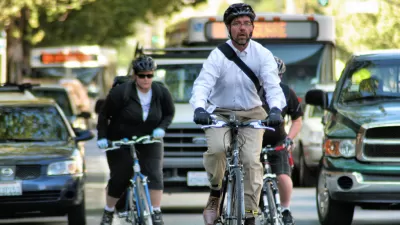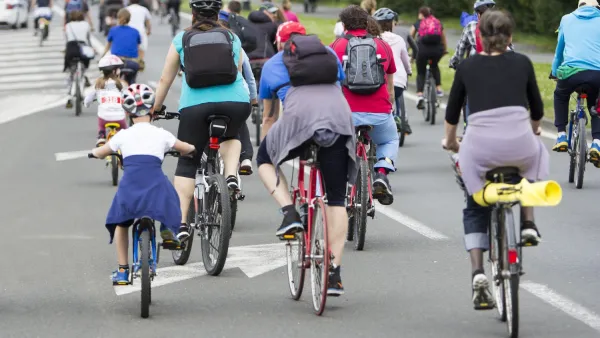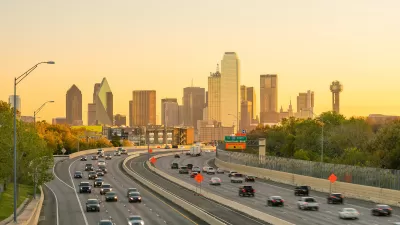More evidence is piling up that commuting by anything but private automobile can increase happiness, social capital, and health.

Gizmodo’s Kellsey Campbell-Dollaghan has compiled the latest evidence that doing almost anything but driving as part of your commute is less stressful and overall healthier for you. The article cites a recent study by researchers at McGill University in Montreal, published in the October 2015 issue of Transportation Research, that found those who walk as part of their commute, whether the entire distance from home to office or as just a segment of their commute (i.e., home to transit stop), reported walking is the least stressful mode to commute.
For urban planners and sociologists the mode of commute also holds significant impacts for building a cohesive and successful community. Via the article: "A recent study of more than 21,000 people in Scania, Sweden, found that people who commute by car not only are less social–attending fewer social events, family gatherings, or public events–but they have lower trust, with more drivers reporting that they couldn’t trust most people. Meanwhile, active commuters—walking or biking—and even transit commuters reported much higher social participation and trust in others."
Ultimately, getting out of the car may result in a longer and healthier life, with one study from the University of Utrecht in the Netherlands finding that the switch from car to bicycle as the mode of commuting "would add between three months to 14 months" to a person's lifespan.
FULL STORY: The Best Ways to Get to Work, According to Science

Maui's Vacation Rental Debate Turns Ugly
Verbal attacks, misinformation campaigns and fistfights plague a high-stakes debate to convert thousands of vacation rentals into long-term housing.

Planetizen Federal Action Tracker
A weekly monitor of how Trump’s orders and actions are impacting planners and planning in America.

In Urban Planning, AI Prompting Could be the New Design Thinking
Creativity has long been key to great urban design. What if we see AI as our new creative partner?

King County Supportive Housing Program Offers Hope for Unhoused Residents
The county is taking a ‘Housing First’ approach that prioritizes getting people into housing, then offering wraparound supportive services.

Researchers Use AI to Get Clearer Picture of US Housing
Analysts are using artificial intelligence to supercharge their research by allowing them to comb through data faster. Though these AI tools can be error prone, they save time and housing researchers are optimistic about the future.

Making Shared Micromobility More Inclusive
Cities and shared mobility system operators can do more to include people with disabilities in planning and operations, per a new report.
Urban Design for Planners 1: Software Tools
This six-course series explores essential urban design concepts using open source software and equips planners with the tools they need to participate fully in the urban design process.
Planning for Universal Design
Learn the tools for implementing Universal Design in planning regulations.
planning NEXT
Appalachian Highlands Housing Partners
Mpact (founded as Rail~Volution)
City of Camden Redevelopment Agency
City of Astoria
City of Portland
City of Laramie





























